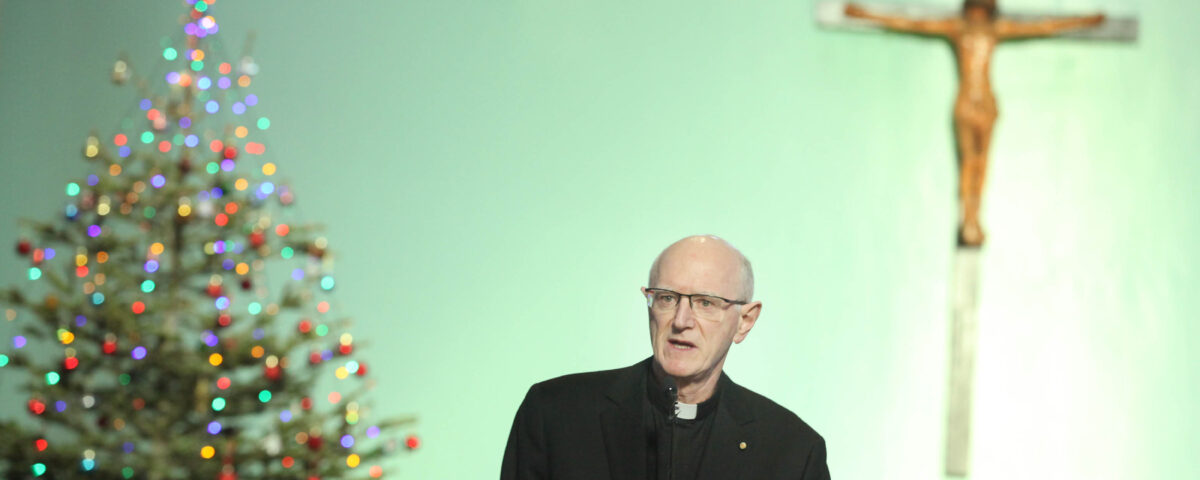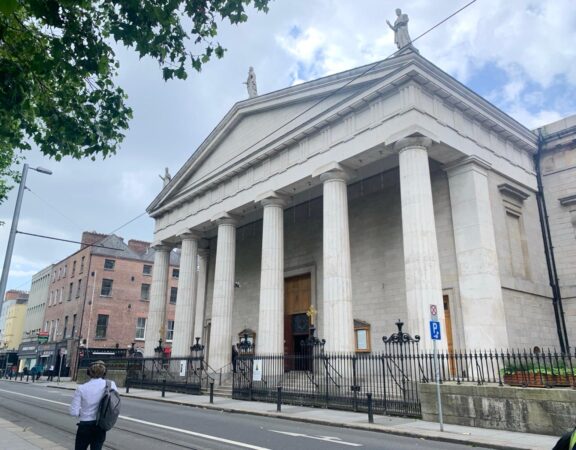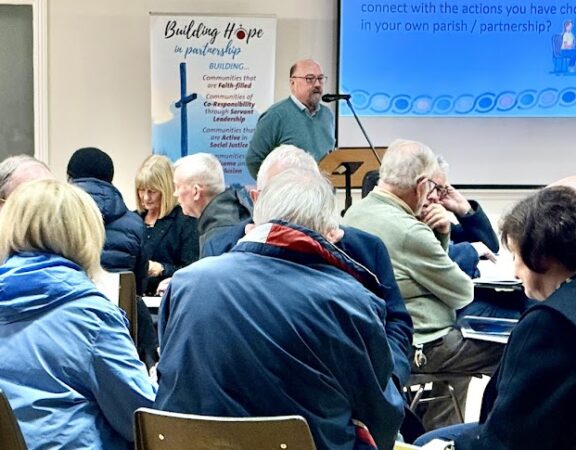Address of Bishop Dermot Farrell on his appointment as Archbishop of Dublin
Church of Our Lady of Lourdes, Sean McDermott Street, Dublin 1
It is with a humble heart that I accepted Pope Francis’s invitation to serve the people and clergy of the Diocese of Dublin as bishop. I am glad to accept the call to serve in Dublin, to be a pastor in this place, and in this community of faith. For the last three years I have been Bishop of Ossory where I have been very happy and fulfilled. As you will understand, I have a certain sadness in leaving Ossory, its priests and its people. However, I come in hope, and I am confident that I will also be happy in Dublin.
We live in a time of profound and rapid change. Our world is changing before our eyes, our country is changing deeply, and our Church changes beneath our feet. Together, we are called to find a way into the future that God opens before us. The only genuine way into the future is a shared way, a way together. Níl ach fíorshlí amháin, slí le chéile. It will mean listening to the Spirit (see Rev 2:7; also Pope Francis on synodality, in particular, his address during the commemoration of the 50th anniversary of the institution of the Synod of Bishops [17 October, 2015], as well as his address to the International Theological Commission, [29 November, 2019]). Everyone in this diocese — laity, clergy, religious, those who embrace apostolic charisms, as well as the women and men called to a more contemplative way — has something essential to contribute to the future of the faith in Dublin.
We find ourselves in the Season of Christmas; Christmas not only celebrates the birth of Christ at Bethlehem, but the unending birth of God’s light in our lives. It is a time of joy in which we glimpse the eternal in all its mystery, power and wonder. It is a time in which we savour the gentle compassion of God that renews our courage to continue our journey. Three years ago, I took as my episcopal motto, “auditorium nostrum in nomine Domini” — “our help is in the name of the Lord”. As I take up this responsibility to be pastor and a teacher of the faith among you, I place my trust anew in God’s goodness, and in God’s providence out into the future. As we all learn in the end, everything is in God’s hands.
Our lives are in God’s hands. Every person’s life is a mystery. We do not always appreciate this, but that does not make it less true. We do not know what the future will be. What we do know is, that placing our lives in God’s hands, our lives will bear fruit. It was this way for God’s own Son who on the Cross prayed, “into your hands I commend my spirit.” This also is the prayer of Saint Stephen — the Protomartyr, the “First Witness” to Christ and his way. It is for that very reason that Saint Stephen’s Day immediately follows Christmas Day. Like Stephen we are called to witness to Christ, the One who enables us to embrace the mystery of our lives (see Gal 1:14-17) and who gives us the strength to live life to the full (Rom 16:25; John 10:10).
From a young age Dublin has always been part of my life. My late mother worked here as young woman. As a teenager, I spent summer holidays with my aunt and uncle who lived and worked in the Liberties. They introduced me to the history and rich cultural life of the City. Dublin has always been a place of welcome for people from all over Ireland. Now it is a city of welcome for people from all over the world. [and] the Archdiocese of Dublin is more than the city: its 198 parishes — rural and urban — stretch across Leinster. This presents distinctive challenges and opportunities. The challenges to take account of the new cultural and social contexts in which we find ourselves and in which the gospel is proclaimed.
The relationship between the gospel and the culture in which it is proclaimed is always tensive. It was that way for Jesus; it is that way for us. The response of our time to the plurality of positions, diversification of behaviours and variety of cultures cannot go down a road of disillusion and disappointment. We are called to renewal, we are called to encounter: “Isolation and withdrawal into one’s own interests are never the way to restore hope and bring about renewal…it is closeness; it is the culture of encounter” (Fratelli Tutti § 30). It is reaching out towards the other, listening to the other, meeting the other, serving the other. This dialogue with others does not mean diluting the radical nature of the Gospel or manipulating it by restricting its reach. People of faith must still have the courage to proclaim the One who is the Saviour in all His power and newness and mystery. This is all the more necessary in this time when we are confronted with two interconnected crises: the Coronavirus pandemic and the ecological crisis. Both require urgent action, but they also require the sense of purpose which comes from a clear vision. The call for a response to the pandemic that puts the person at the centre has resonated with the churches. The Holy Father keeps before us that the fate of creation is tied is to the fate of all humanity. The ecological and the social go hand in hand. The Churches have a vital role to play in keeping before us the cry of the earth “due to the harm we have inflicted by our irresponsible use and abuse of the goods with which God has endowed our Common Home” Laudato Sì §2).
I am particularly grateful to Archbishop Diarmuid Martin for his warm welcome and encouragement. I am sure that I will be calling on his wisdom and experience in the months ahead. Archbishop Martin accepted the leadership of the Diocese at a challenging time in 2003. Since then, he has provided forceful and unambiguous leadership, especially in safeguarding children where he took courageous positions. Constant vigilance is needed as complacency is the greatest enemy. A Church which is safe for all who are vulnerable, be they young or not so young, can only exist where there is a commitment to truth, genuine transparency and enduring care for the victims. The Church in Ireland has become a humbler Church, a Church more capable of listening — more like Christ who is last of all and servant of all, and who calls us to follow him (Mark 9:35).
This work is never ending. There are many neglected voices we need to hear, particularly the voices of women, the voices of those on the margins, and of those invisible in the busyness of day-to-day life. If we fail to hear these other voices we are all diminished, and the Body of Christ in which we are carried, nurtured, and nourished is less than God wants it to be. Discerning the Body (1 Cor 11:29) is not without cost. Today is the Memorial of Thomas à Becket, Archbishop of Canterbury, martyred in his Cathedral in 1170, and on whose lips T S Eliot put the prophetic words, “to do the right deed for the wrong reason … that is the greatest treason.” Service demands discernment. Motivation is pivotal, as Pope Francis points out in Fratelli Tutti, when he asks, ‘Why I am doing this?’, ‘What is my real aim?’ (§197).
Like Thomas à Becket, saints are women and men who embody Christ in their words and actions. Saints are people who live Christ. We remember Saint Kevin, Saint Laurence O’Toole, the Patron of our Diocese, Catherine McAuley, Matt Talbot, John Sullivan and Margaret Alyward who were “the gospel clothed, as it were, in a body” (A Butler). In the end, the measure of our faith is how we act towards the weakest and poorest all around us.
I would like to take this opportunity to welcome His Excellency Archbishop Jude Thaddeus Okolo, the Apostolic Nuncio, the representative of the Holy Father whose commitment to the weak, the poor and the excluded inspires us so much. I thank Archbishop Okolo for his kindness and guidance during these past weeks.
I would be grateful if you would remember me in your prayers as I begin my ministry as Archbishop, among you and with you.
May the Lord be a sure path beneath our feet,
a bright light before us,
a kindly shepherd with us,
this day, and every day.
(Roman Missal, Blessing for the Feast of Saint Columba).
Saint Laurence O’Toole, Saint Kevin, pray for us. Amen. ENDS
Archbishop Diarmuid Martin at the announcement of the appointment of Bishop Dermot Farrell as next Archbishop of Dublin
Church of Our Lady of Lourdes, Sean McDermott Street, Dublin 1
When my appointment as Archbishop was formally announced, Cardinal Connell at the Press Conference began by saying: “This is not my day; today is the day of the new Archbishop”. I echo these sentiments as I greet and ask God’s blessing on my successor, Archbishop-elect Dermot Farrell.
Some months earlier, on the first Sunday after my nomination as Coadjutor Archbishop, I came to this Church to celebrate Mass. I remember well during the readings being distracted and I began counting the numbers attending the Mass. I got to twenty but then I thought I saw a woman behind one pillar and another behind another pillar. Eventually I got to 25.
Only a few weeks ago, I said Mass here and the number was 50, the maximum number allowed. Things have happened over the years and this is a vibrant parish with great people – indeed courageous people who take real leadership in their community. It has a great school. The parish serves people in their joys and in their many difficulties and sorrows and challenges. The Salesian Fathers and the Parish Sister have done great work.
The last time I brought a visitor to this parish it was Pope Francis. This is the only simple Parish Church in Ireland ever visited by a Pope. Bishop Farrell you have a lot to live up to!
I am really delighted that Archbishop-elect Farrell has chosen this parish at the start of his ministry. It shows where his heart lies. ENDS








